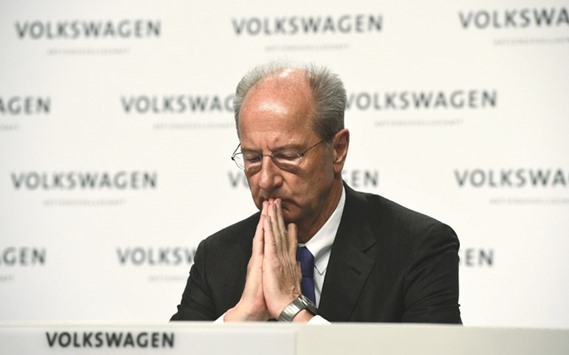German prosecutors have widened a probe into suspected market manipulation by managers at Volkswagen to include the carmaker’s supervisory board chairman Hans Dieter Poetsch, VW said yesterday.
The investigation, which relates to Poetsch’s time as finance chief of VW, is the latest fallout from the carmaker’s admission last year that it cheated on diesel emissions tests.
VW has admitted that it installed software that deactivated pollution controls on more than 11mn diesel vehicles sold worldwide, rattling its global business, damaging its reputation and prompting the departure of chief executive Martin Winterkorn.
Adding to its woes, a German newspaper reported on Sunday that a US regulator found another cheat software device in vehicles made by its luxury division Audi.
The paper said the device was not the same as the one which triggered last year’s diesel emissions scandal at Audi parent VW.
Audi has declined to comment on the report.
The prosecutor’s office in Braunschweig first announced the market manipulation probe in June, targeting former CEO Winterkorn and VW brand chief Herbert Diess for suspected market manipulation related to the emissions scandal.
The prosecutor’s office said at the time that its probe centred on evidence that VW’s duty to disclose possible financial damage from the emissions test cheating may have arisen before September 22, 2015, when the carmaker publicly admitted its wrongdoing.
“Based on a thorough examination by internal and internal legal experts, the company reaffirms its belief that VW’s management fulfilled its duties to inform the capital market,” VW said yesterday.
VW said the company and Poetsch, who was finance chief of Volkswagen from 2003 until he became chairman in October 2015, would fully support the prosecutor’s office in its investigation.
The prosecutor’s office in Braunschweig was not immediately available for comment.
Sunday’s Bild am Sonntag report said that the California Air Resources Board (CARB) had made a new discovery of cheating software in an automatic transmission Audi in summer 2016.
CARB has declined to comment on the report.
Audi, the main contributor to earnings at parent VW, had already admitted last year to using illicit emissions-control devices in about 85,000 3.0 litre diesel engines and has so far this year set aside €752mn ($838mn) to cover related costs.
Bild am Sonntag, which cited no sources, said the software in CARB’s new discovery lowered carbon dioxide emissions by detecting whether a car’s steering wheel was turned as it would be if it was driving on a road.
If the steering wheel was not turned, as if it was being tested in a laboratory, the software turned on a gear-shifting programme which produced less carbon dioxide, allowing the car to meet the emissions criteria.
If the wheel turned by more than 15 degrees, as if it was being driven, it turned the software off.
The newspaper did not say if other performance criteria improved when this was switched off.
Audi stopped using the software in May 2016, just before CARB discovered the manipulation in an older model, the paper said.
It said the affected transmissions were used in several hundred thousand vehicles, adding that the carmaker had suspended several engineers in connection with the matter.
Any revelation of further cheating software would be a major setback after VW just reached a near $15bn settlement with US regulators and car owners, crossing one of the biggest hurdles in the clean-up of the scandal.

Hans-Dieter Poetsch, supervisory board chairman of Volkswagen, during a press conference in Wolfsburg, central Germany. The new investigation, which relates to Poetsch’s time as finance chief of VW, is the latest fallout from the carmaker’s admission last year that it cheated on diesel emissions tests.
